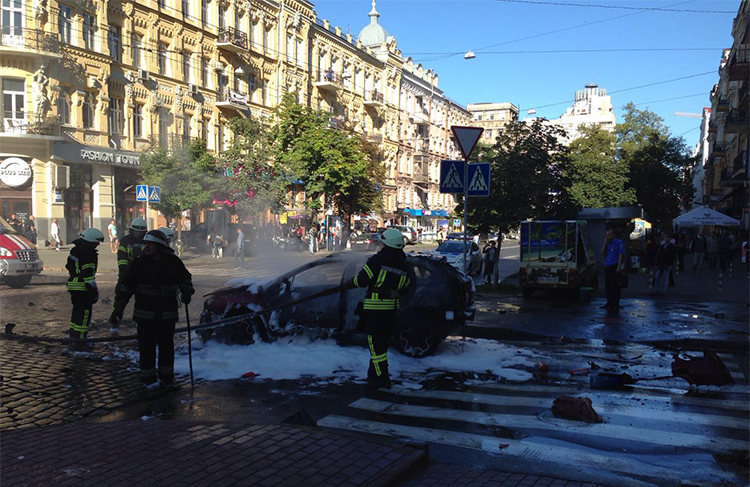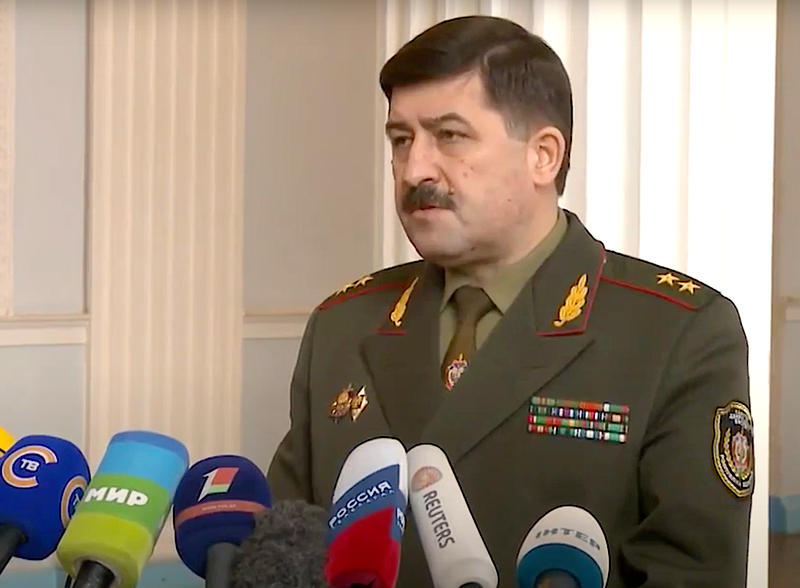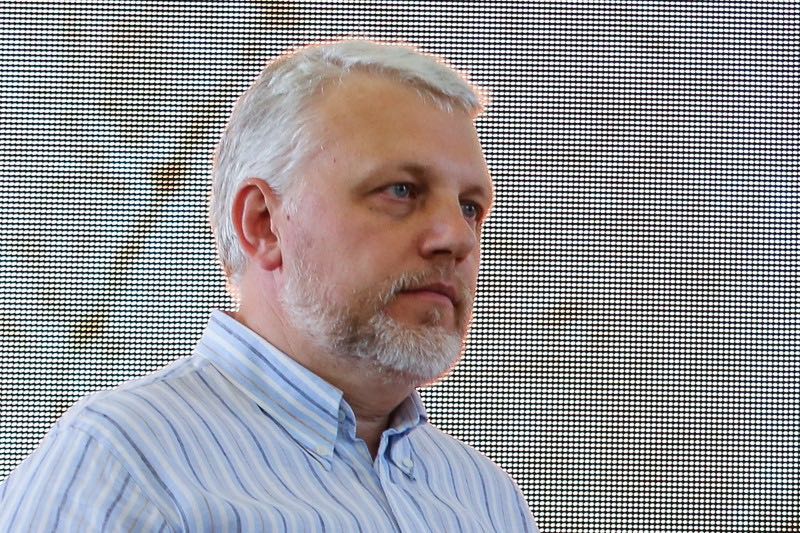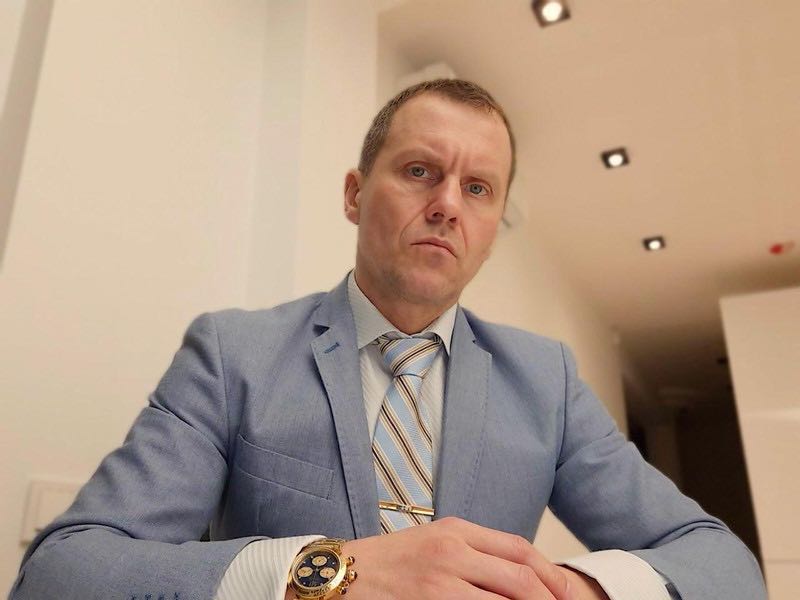After the disclosure of the assassination plot against Navalny by the FSB, new leaks this time point to the Belarusian KGB, planning the murder of political opponents of Lukashenko. It sheds new light on the killing of the Belarusian journalist Pavel Sheremet, who died in a car bomb in Kyiv in 2016. Our columnist Mark Galeotti on the Belarusian KGB's lack of tradecraft and the complicated relationship between the secret services of Russia, Belarus and Ukraine.
 The Belarusian journalist Pavel Sheremet, who fled Belarus and Russia, was killed with a car bomb in Kyiv in 2016
The Belarusian journalist Pavel Sheremet, who fled Belarus and Russia, was killed with a car bomb in Kyiv in 2016
The release by online newspaper EUobserver of an historical recording in which former Belarusian KGB (BKGB) chief Vadim Zaitsev talked about wanting to have dissidents abroad assassinated has thrown Minsk’s policies and capabilities into sharp relief.
The recording, which dates back to 2012, has not been officially confirmed (as if it would), but individuals familiar with Zaitsev have confirmed that it is his voice. He is heard in conversation with officers from the BKGB’s Alpha Group, an elite counter-terrorism unit.
By Zaitsev’s own account, Belarusian president Lukashenko had put 'over $1.5 million' into an operational account, and the initial targets were three exiles with security backgrounds, all then living in Germany: Oleg Alkaev, the former head of Detention Centre No. 1, OMON riot police commander Colonel Vladimir Borodach, and Vyacheslav Dudkin, once of the Ministry of Internal Affairs (MVD) anti-corruption unit.
The idea had been to conduct covert assassinations so as not to provoke German ire. ('It's important to me that no one even thinks about the KGB.') On the other hand, for the [Belorusian] journalist Pavel Sheremet, who by then was in Russia, Zaitsev wanted a demonstrative murder: 'We’ll plant [a bomb] and so on and this fucking rat will be taken down in fucking pieces – legs in one direction, arms in the other. If everything [looks like] natural causes, it won't get into people's minds the same way.'
 KGB-chief Vadim Zaitsev in 2012 (picture MsOnlySee)
KGB-chief Vadim Zaitsev in 2012 (picture MsOnlySee)
It should hardly surprise that Zaitsev – not known as a sensitive and humanistic soul – should be talking and thinking in such terms. However, that this dates back to 2012, and that the BKGB were working on the assumption that they would go it alone, raises some issues that are relevant today now that the Lukashenko regime is fighting for its life.
The BKGB’s capabilities
The officers in the meeting with Zaitsev were reportedly members of the Alpha Group’s Seventh Department. While Alpha is primarily a counter-terrorism force used for hostage-rescue, armed seizure and similar missions, the Seventh Department is a covert operations team, established by Zaitsev specifically to target the political opposition.
KGB-chief Zaitsev: 'We’ll plant [a bomb] and so on and this fucking rat will be taken down in fucking pieces – legs in one direction, arms in the other'
Colonel Oleg Chernyshev, head of Alpha, was placed under sanctions by the US government for human rights violation activities in 2010. Tellingly, in 2014, he was made head of the BKGB’s Foreign Intelligence Directorate, UVR. However, the BKGB has from the first day of Belarusian independence been primarily a domestic security. Whereas in the old Soviet KGB, the First Chief Directorate, its foreign intelligence arm, was an elite-within-an-elite, the UVR was very much the poor relation, especially to the Main Directorate for the Protection of the Constitutional System and the Fight against Terrorism (GUZKS), which is the primary political policing service.
Although it is also suspected that there is a foreign surveillance capability within the Main Directorate for Provision of Operational-Search Activities (GUOORD), essentially the BKGB’s overseas operations have largely been confined to monitoring the activities of emigres and opposition figures.
Certainly the conversation suggests no greater capabilities were in place then. It is striking in the way it emphasises the lack of tradecraft and established means of so-called 'wet work' – assassination – at the BKGB’s disposal. 'It’s clear how we could drown or shoot someone. It’s clear. But how to initiate a chance explosion, how to start arson and not leave traces, murder, and stuff like that – this is unclear,' bemoans Zaitsev.
There is talk of trying to find 'a professional or a car mechanic' able to tamper with the targets’ cars 'in such a way that no fucking expert will figure out that the car was intentionally broken in advance'.
Likewise, one of the officers present raised 'a professor in Vitebsk, who is a toxicology expert, knows both natural and artificial poisons very well', and 'an amateur chemist who claims he can make any chemicals'.
BKGB versus the Muscovites
This is a far cry from the capabilities of the Soviet KGB or, indeed, today’s Russian services. It highlights one interesting point: the poor relationship between the BKGB and the Varyagy, a nickname referring to the historical 'Varangians’ from Scandinavia who once colonised Muscovy. Nowadays, in Minsk as in Russia's regions, it is the equivalent for interfering outsiders from Moscow.
It has long been a matter of dispute in the West how far the BKGB was integrated with its Russian counterparts. For some, it was virtually a local subdivision, for others a distinct and often antagonistic agency. After all, Lukashenko was determined to maintain his freedom of manoeuvre and this required not only having loyal security forces, but using them to ensure Moscow was not able to build up a network of local allies and proxies the way it had in Ukraine before 2014, for example.
Thus, arguably the main role of the BKGB’s Main Directorate of Counterintelligence Activities (GUKD) was actually to prevent Russian penetration. While on the surface there was cordiality and cooperation, in practice this was a much more tense relationship.
This helps explain why a separate BKGB surveillance report, also obtained by EUobserver, appears to prove that journalist Sheremet was under covert observation while he was in Moscow, possibly by GUOORD officers taking advantage of the free movement between the two countries. It would have been much easier under other circumstances, after all, to have relied on the Russian Federal Security Service (FSB) to do it instead, on their home turf.
The Sheremet case
None of the three emigres in Germany were ultimately attacked. However, four years later, on 20 July 2016, after he had left Moscow for Kyiv and become increasingly critical also of the Kremlin, Pavlo Sheremet was killed by a car bomb. The Ukrainian authorities immediately suggested a Russian connection. As years passed without arrests, the independent media became more and more outspoken about the failings of the investigation, especially the Security Service of Ukraine (SBU).
 Journalist Pavel Sheremet was killed with a car bomb in Kyiv in 2016
Journalist Pavel Sheremet was killed with a car bomb in Kyiv in 2016
In December 2019, five veterans of the fight against Russian-backed forces in the Donbas were arrested and accused of the murder. It did not take long for discrepancies in the official accounts to emerge, and in January 2020, the government case collapsed for lack of sufficient evidence.
Nonetheless, the Zaitsev recordings raise the possibility that this may have been a BKGB operation, something that seems to have been discounted by the SBU, especially given the pyrotechnic methods used.
Furthermore, Minsk would presumably have had far fewer concerns about overt ‘wet work’ in Ukraine than in Germany. Potentially, Minsk also had contacts in Kyiv, not least as the SBU was also largely drawn originally from veterans of the Soviet security agencies. There have been allegations that Sheremet was under SBU surveillance when he was killed, and that an SBU asset was even physically present. Some have even alleged that the SBU might have been responsible. This has always seemed implausible, but the thought that elements within the SBU – whether for money or because of past contacts – turned a blind eye to a BKGB killing is now again being considered.
Igor Makar, the former Belarusian MVD Almaz special forces deputy commander who was the source of the EUobserver tape, has since been contacted by the Ukrainian authorities and is reportedly due to testify. It remains to be seen if he can shed a light on this murky story.
 Igor Makar, former Belarusian MVD Almaz special forces deputy commander, is the source of the tape
Igor Makar, former Belarusian MVD Almaz special forces deputy commander, is the source of the tape
And now?
Zaitsev, whom the EU described as 'responsible for transforming the KGB into the main organ of repression of civil society and of the democratic opposition', left the BKGB later in 2012, but not in disgrace: he went on to become CEO of Kosmos-TV. After a week-long place-holding by former defence minister Leonid Maltsev, he was succeeded by Valery Vakulchik. Vakulchik, who lasted until last year, was a forceful figure in Zaitsev’s mould, but also a man who was increasingly out of favour in Moscow, precisely because of the vigour with which he kept the ‘Varangians’ at bay.
The Belarusian KGB is very distinct from the Russian security services and as Lukashenko seeks to regain his autonomy, the relationship will become more tense again
It was Vakulchik, for example, who engineered the arrest of Russian Wagner Group mercenaries at the Belorusochkaya sanatorium in July 2020, as they awaited transfer to their next posting. Alpha commandos detained 32 of them, on the charge that they were in Belarus to destabilise the country. This was, after all, when Lukashenko was still trying to play the anti-Russian card before the presidential elections of 9 August. The mercenaries were later released, but Moscow would not forgive, and Vakulchik’s scalp was likely a condition of their conditional support of Lukashenko since.
Now the head of the BKGB is Ivan Tertel, a former paratrooper and border guard and a man who, incidentally, has also been under EU sanctions since 2012. Although more agreeable to Moscow than Vakulchik – which, by autumn 2020, wasn’t saying much – he was also a key figure in the engineering of a criminal case against presidential candidate Viktor Babariko, the former head of Belgazprombank. Babariko was and is very much Moscow’s man, and although Tertel, along with National Bank chief Pavel Kallaur, then visited the Russian ambassador to try and explain the case and win Moscow’s support, this seems to have been in vain.
In other words, although the realities of the situation are rather different now, the BKGB is still very definitely distinct from the Russian security services. As Lukashenko apparently seeks to regain his autonomy, the relationship is likely only to become more tense again.
The implication is that if it is going to continue to operate abroad, the BKGB will be relying on its own resources rather than being able to tap Russia’s rather more extensive and experienced ones.
By all accounts, the Alpha Group’s Seventh Department now has a new name, and maybe even a new subordination. There have been hints that it has been transferred to the UVR, in a role modelling the Russian Foreign Intelligence Service (SVR) Zaslon special operations force, one with a dual diplomatic security and covert missions role.
If so, this is presumably because Minsk envisages further such activities. The focus on defectors from the security apparatus in Zaitsev’s plotting echoes a present concern about dissent within the ranks and the potential impact of members joining the opposition, given the extent to which Lukashenko is now dependent upon the OMON and other police units. With accounts of more and more police officers in particular breaking ranks – and active attempts to encourage this by the opposition - the risk is that what Zaitsev threatened, Tertel may feel he has to deliver.
